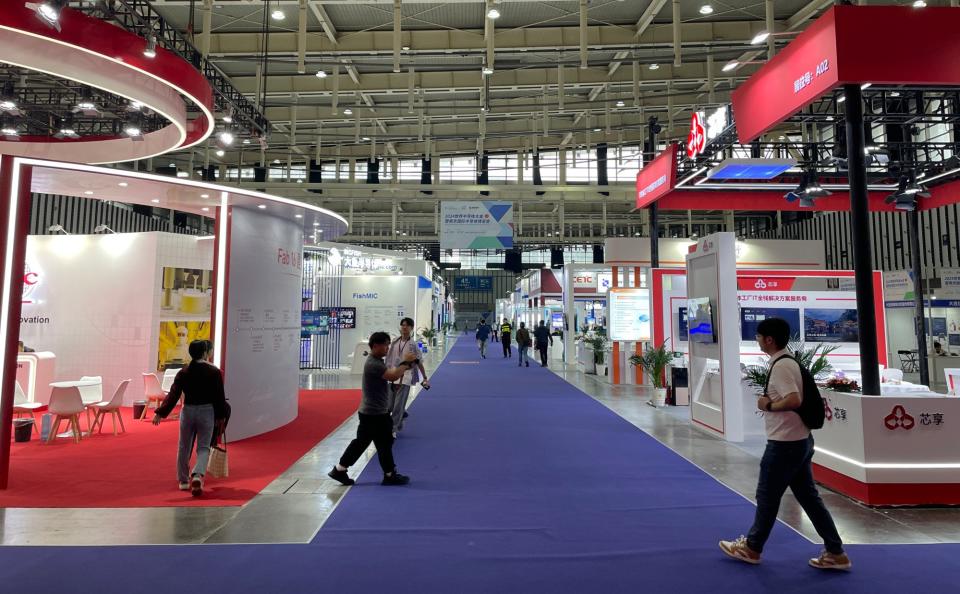Huawei says its AI chip better than Nvidia's A100 amid China's self-reliance drive
A Huawei Technologies executive said the company's latest artificial intelligence (AI) chip is on par with, if not better than Nvidia's A100 - one of the most popular graphics processing units (GPUs) used in the AI industry - in a rare boast by the Chinese tech giant that underscores how quickly it is growing in a market dominated by its US rival.
Huawei's Ascend 910B AI chip has been found in some tests to deliver 80 per cent of the efficiency of an Nvidia A100 when training large language models, but "in some other tests, Ascend chips can beat the A100 by 20 per cent", said Wang Tao, chief operating officer of Huawei Ascend and Kunpeng ecosystem, on the sidelines of the Nanjing World Semiconductor Conference on Thursday.
There is "not much difference" between the computing power performances of the Huawei 910B and Nvidia A100 in large AI model training, Wang added.
Do you have questions about the biggest topics and trends from around the world? Get the answers with SCMP Knowledge, our new platform of curated content with explainers, FAQs, analyses and infographics brought to you by our award-winning team.
His comments come as Huawei assumes an increasingly important role in China's self-sufficiency drive, as Nvidia is unable to ship to the country its advanced GPUs under strict US export restrictions.
Huawei first introduced the Ascend chip series in 2019, four months after the company was added to a US trade blacklist. Since then, its AI strategy has focused on building an ecosystem of proprietary software and hardware designed to serve domestic clients that have lost access to equivalent technology overseas.
Zhang Dixuan, head of Huawei's Ascend computing business, revealed last month that the Ascend ecosystem had 40 hardware partners, 1,600 software partners and 2,900 AI application solutions.
Despite its ambitions, Huawei has rarely spoken publicly about its efforts to free itself from the shackles of US sanctions aimed at stemming China's technological advancement in semiconductors and AI.
The company has closely guarded the source of the advanced mobile chips that power the Mate 60 smartphone series launched last August - its first 5G handsets in more than two years.
Experts believe the processors were manufactured by US-sanctioned Semiconductor Manufacturing International Corp, China's top foundry, using improved techniques based on existing equipment.
But analysts have said it would be challenging for Chinese manufacturers to produce high-performance AI computing chips using older systems because in general, AI chips are much bigger than smartphone chips. For example, Nvidia's A100 is eight times larger than Apple's A13 mobile processor.
Nvidia has designed lower-grade chips tailored for China-based clients to keep serving one of the company's largest markets. In the first half of last year, Nvidia processors made up 90 per cent of the 500,000 AI chips that were sold in China, with Huawei grabbing only 6 per cent of the market.
But after Washington in October escalated its export curbs to cover more of Nvidia's chips, CEO Jensen Huang said earlier this year that the firm is facing "a lot more competition in China" because of limitations on the technology it can sell there.

The main exhibition hall of the World Semiconductor Conference taking place in Nanjing, eastern China. Photo: Che Pan alt=The main exhibition hall of the World Semiconductor Conference taking place in Nanjing, eastern China. Photo: Che Pan>
While Huawei's best chips are technologically inferior to the latest GPUs from Nvidia, which just overtook Apple as the world's second-most valuable firm, the Chinese company's Ascend 910B and Kunpeng chips have emerged as top alternatives for domestic companies working in AI.
Ascend chips have proliferated in various industries through so-called AI boxes - all-in-one machines that combine AI chips, industry-specific algorithms and pre-trained large AI models. Chinese tech giants, including Tencent Holdings and Baidu, as well as leading start-ups like iFlyTek, have bought 910B chips, according to Huawei's Wang.
Huawei operates computer clusters running on Ascend chips in 19 cities across China, including Beijing, Shanghai and Shenzhen. It also has plans to bring new clusters online in major provincial capitals, including Kunming in southwestern Yunnan, Changsha in central Hunan, Changchun in northeastern Jilin and Jinan in eastern Shandong.
This article originally appeared in the South China Morning Post (SCMP), the most authoritative voice reporting on China and Asia for more than a century. For more SCMP stories, please explore the SCMP app or visit the SCMP's Facebook and Twitter pages. Copyright © 2024 South China Morning Post Publishers Ltd. All rights reserved.
Copyright (c) 2024. South China Morning Post Publishers Ltd. All rights reserved.

 Yahoo Finance
Yahoo Finance 